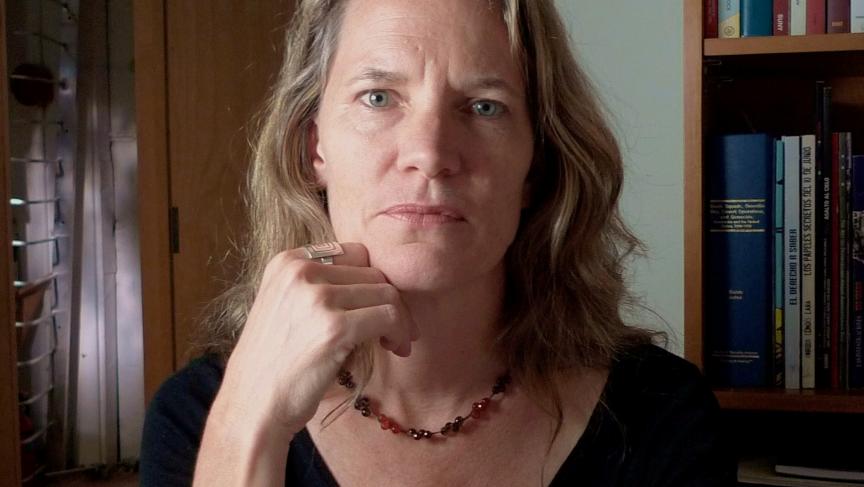Faces of ALBA-VALB: Kate Doyle
Kate Doyle, winner of the ALBA-Puffin Award for Human Rights Activism, now serves on ALBA’s Board of Governors where she leverages her formidable expertise. Aaron Retish speaks with her about her work uncovering U.S. involvement in Latin American human rights violations.
You are Senior Analyst at the National Security Archive. What is the National Security Archive and what is your role there?
The Archive, based at George Washington University, is a non-profit organization unlike any other I know: it is a research institute, library, advocacy group, and center for investigative journalism, all at the same time. Founded in 1985, the Archive was created to fight for the people’s right to know. For 30 years, we have used the Freedom of Information Act to go after the hidden history of US foreign and national security policy and have made the resulting millions of pages of declassified US documents open and available to the public. We also work with activists and scholars in countries around the world to help them draft and pass their own access to information laws, open secret police files, and draw on government archives for historical and contemporary human rights purposes. My own role at the Archive is as an analyst of US policy in Latin America and the director of the Evidence Project, which connects the right to truth and access to information with human rights and justice struggles.
How has your work throughout Latin America shown the link between access to records and protecting human rights? Do you remember one moment in particular when you found a document that revealed the truth?
Information about past state violence can be a powerful tool in the hands of human rights defenders. We’ve used US and Latin American government archives to challenge policies of secrecy and repression, give families of the disappeared new details about what happened to their loved ones, help identify bodies found in exhumed mass graves, deepen truth commission investigations, and serve as evidence in criminal prosecutions. Sometimes records simply confirm suspicions about a particular violation; other times they can be critical in holding officials accountable for human rights atrocities. I’ll never forget when a military logbook of the disappeared was smuggled out of the Guatemalan army’s secret files and leaked to me. Although families suspected their relatives had been abducted and killed by government security forces, the document was definitive proof, and contained all kinds of details about the crimes. It was devastating, but at the same time an enormous relief to families to finally know what happened and at whose hands.
Human rights work is hard—it is frustrating, incremental, and sometimes almost unbearably painful. And impunity is always lurking around the corner.
Your amazing work bringing to light the crimes of the brutal dictatorship in Guatemala has resulted in important publications of documents as well as the award-winning documentary Granito: How to Nail a Dictator. How did you become involved in the documentary?
I got to know Granito’s director, Pamela Yates, when she was still shaping her ideas about the documentary. I was familiar with her transcendent earlier film, When the Mountains Tremble (1983) – famous inside Guatemala as a unique chronicle not only of the military’s scorched-earth campaigns against the Mayan people, but of the revolutionary movements that sought to topple the government. So I was thrilled to meet her! Pamela and I spent months talking about what her new film could be, and she eventually pulled me into the project as one its “granitos de arena” – that is, “grains of sand,” those who try to make some kind of contribution, however modest, to achieving human rights progress.
You were the recipient of the ALBA-Puffin Foundation Award for Human Rights Activism in 2012. What did the award mean to you?
The award was a wonderful, unexpected affirmation of the work we do at the National Security Archive. The fact that I shared it with my friend and colleague Fredy Peccerelli of Guatemala’s Forensic Anthropology Foundation made it all the more special. Human rights work is hard, so hard. It is frustrating, it is incremental, it is sometimes almost unbearably painful, and impunity is always lurking around the corner. The award gave us a rare opportunity to celebrate together and look to the future with optimism and hope.
What is the main focus of your work now at the NSA?
I continue to work with prosecutors in Guatemala to construct solid criminal cases against human rights violators. We also collaborate with human rights defenders all over Latin America to unearth local archives on historic abuses, strengthen existing freedom of information laws, and challenge impunity for human rights crimes, past and present. Finally, with the financial support that the ALBA/Puffin award provided, I am writing a book about Guatemala’s fight for justice in the hope that it can help future generations of human rights defenders there and elsewhere in Latin America identify what works to dismantle the legacy of political violence and to restore faith that change is truly possible.













